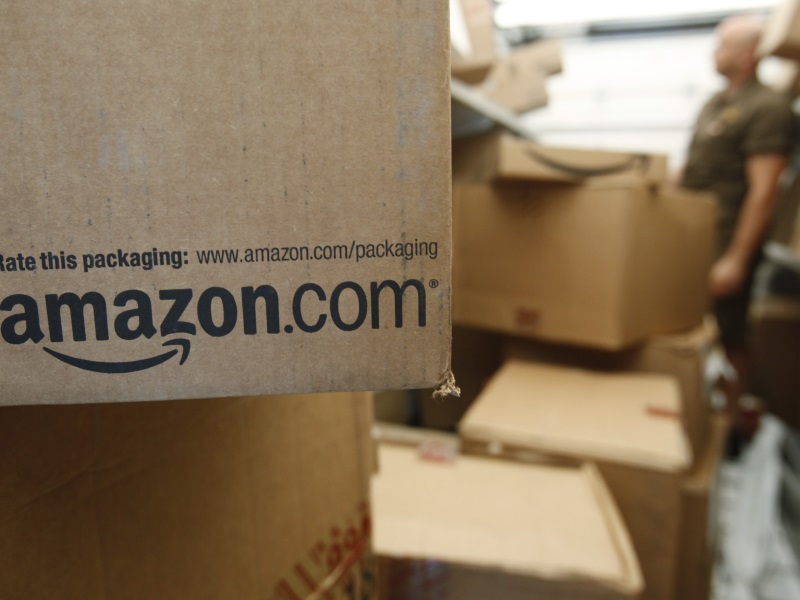- Home
- Internet
- Internet News
- Amazon Challenges Etsy With Amazon Handmade
Amazon Challenges Etsy With Amazon Handmade

The move throws down the gauntlet to craft-selling site Etsy. But at least at the time of launch, the two sites will have a very different seller base, fee structure and stances on manufacturing.
Amazon started offering invitations in May to join Handmade, giving sellers access to Amazon's 285 million shoppers. The Seattle-based retailer says the site, which will carry everything from $30 (roughly Rs. 1,950) walnut cufflinks from Australia to $325 (roughly Rs. 21,100) handmade quilts from Wisconsin, sprang from customer feedback and site searches for crafty items.
"We had thousands of searches every day from customers looking for handmade or handcrafted items," said Peter Faricy, vice president for Amazon Marketplace.
That focus also pits it directly against Etsy Inc., which started 10 years ago as a marketplace for homemade goods and went public in April. But they're a bit different in size and scope.
At launch, Amazon Handmade will include about 5,000 sellers from 50 states and 60 countries offering 80,000 items. Amazon takes a 12 percent fee from overall sales made by Amazon Handmade sellers and includes payment processing, discounted shipping and access to other Amazon services. There's no listing fee or monthly fee to start.
In contrast, New York-based Etsy has 1.5 million sellers and 21.7 million buyers as of June 30. It takes a 3.5 percent fee on overall sales and a 20 cent listing fee per item listed.
They also differ in terms of manufacturing policy. Amazon says sellers have to fill out an online application to be approved to sell on the site and all items sold on the site must be "factory-free" and not made by manufacturers.
New York-based Etsy, on the other hand, started letting some merchants apply to use manufacturers for some products in 2013. In September, Etsy said it was creating a new Etsy manufacturing marketplace to make it easier for its sellers to find "responsible production assistance." Manufacturers can apply to be part of the program and Etsy approves them based on certain criteria.
The divide on manufacturing highlights the challenge that platforms for handmade craft sellers face: They want to preserve the personal nature of handmade goods but also help their sellers (and themselves) grow and make more money.
Etsy CEO Chad Dickerson said Etsy Manufacturing grew out of trying to help sellers that have reached a point where they need outside help to grow.
"It's really about providing access to values-aligned producers, often in the sellers' own community," he said.
As far as competing against Amazon, Dickerson said that about half of Etsy sellers already sell via multiple venues, and of those sellers, Etsy is still usually their primary source of income.
"We believe that Etsy is the best platform for the creative entrepreneur," he said. "Etsy has a decade of experience understanding the needs of artists and sellers and supporting them in ways that no other marketplace can."
Catch the latest from the Consumer Electronics Show on Gadgets 360, at our CES 2026 hub.
Related Stories
- Samsung Galaxy Unpacked 2025
- ChatGPT
- Redmi Note 14 Pro+
- iPhone 16
- Apple Vision Pro
- Oneplus 12
- OnePlus Nord CE 3 Lite 5G
- iPhone 13
- Xiaomi 14 Pro
- Oppo Find N3
- Tecno Spark Go (2023)
- Realme V30
- Best Phones Under 25000
- Samsung Galaxy S24 Series
- Cryptocurrency
- iQoo 12
- Samsung Galaxy S24 Ultra
- Giottus
- Samsung Galaxy Z Flip 5
- Apple 'Scary Fast'
- Housefull 5
- GoPro Hero 12 Black Review
- Invincible Season 2
- JioGlass
- HD Ready TV
- Laptop Under 50000
- Smartwatch Under 10000
- Latest Mobile Phones
- Compare Phones
- Honor Magic 8 RSR Porsche Design
- Honor Magic 8 Pro Air
- Infinix Note Edge
- Lava Blaze Duo 3
- Tecno Spark Go 3
- iQOO Z11 Turbo
- OPPO A6c
- Samsung Galaxy A07 5G
- Lenovo Yoga Slim 7x (2025)
- Lenovo Yoga Slim 7a
- Lenovo Idea Tab Plus
- Realme Pad 3
- Moto Watch
- Garmin Quatix 8 Pro
- Haier H5E Series
- Acerpure Nitro Z Series 100-inch QLED TV
- Asus ROG Ally
- Nintendo Switch Lite
- Haier 1.6 Ton 5 Star Inverter Split AC (HSU19G-MZAID5BN-INV)
- Haier 1.6 Ton 5 Star Inverter Split AC (HSU19G-MZAIM5BN-INV)







![[Sponsored] Haier C90 OLED TV | Dolby Vision IQ, 144Hz OLED and Google TV in Action](https://www.gadgets360.com/static/mobile/images/spacer.png)









